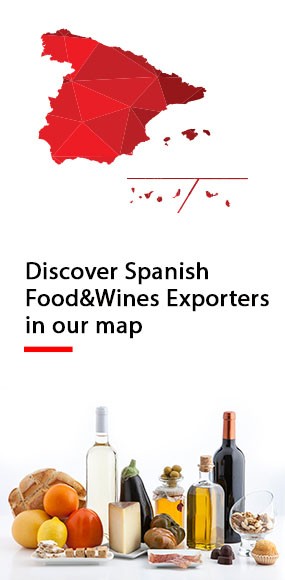.png.transform/rendition-xs/image_image%20(1).png)
Interview with Caleb Ganzer, Managing Partner for Compagnie des Vins Surnaturels
Caleb Ganzer is the Managing Partner for Compagnie des Vins Surnaturels, a New York City wine bar focused on organic and off-the-beaten path fine wines

What is it about these kinds of wines that excites you most?
The wines that Compagnie gets excited about are high touch, low production, thoughtfully crafted, and creative. We love to drink these wines and meet the people behind them. This whole supply chain is high quality, thoughtful, and interesting.
Spanish wine is culture—it's the continuation of traditions that have been handed down for generations, and the more interesting and unique the grape varietals, the better. Spain has more biodiversity and new flavors than we've ever had before. Life is short; it’s experiential and it should not be homogenized. We should not be eating and drinking the same thing! So we feel it's our duty to share the variety of these Spanish wines, which our guests love.
Spain has the largest acreage of organic vineyards worldwide. What makes Spain so well suited for this?
Some places just win the geographical lottery when it comes to grape-growing. There are just certain places that are better for different types of viticulture or different types of agriculture. Spain is just in that perfect bound of latitude and longitude. And there's a lot of natural climatic and geological influences, and also cultural influences, that allow for exceptional winemaking to happen. So the fact that Spanish wine producers leverage these natural strengths and not try to control them but rather let them express themselves, I think, is very important.
How did you get involved in the wine world? What inspired you to move to Compagnie?
I was originally going to work for the UN or work in diplomacy. And I was going to be able to travel that way and meet new people and see new things—and then found that well, you don't really make much money in diplomacy.
Before Compagnie, I did the classics: I worked at the fine dining restaurants, the three-star Michelin and four-star New York Times ones, and went through fine dining bootcamp, if you will. That's good to lay a foundation, but it's not necessarily something you want to do for an entire lifetime. So I learned the classics, I learned what to do and what not to do, and learned about a really high, elegant, luxurious sort of market. But I'm a kid from the cornfields and soybean fields of Illinois, and so that world never really felt like home to me.
What does feel like home is that middle ground of being in a vineyard with the winemaker—who is also very often a farmer. Usually, people sell the raw product and then someone else transforms it. . . but in wine, there's an element of not just agriculture, but also craft.
I wanted to try and find a mix of those worlds, and a wine bar is that perfect middle ground where it's not quite a fine dining restaurant, but it's not quite a dive bar. It's somewhere in the middle and that's where I feel most comfortable.
There are seemingly endless regions, grapes, and things to learn about Spanish wine. Was there any experience or resource in particular that you think of as your “aha moment” in starting to learn about or work with Spanish wine?
When you first come across Spanish wine, especially in secondary or tertiary markets, you usually only see the wines that are most exported. So for me, that was sort of like the high/low version of Spanish wine. It was the $8-10 wines that were juicy, full bodied, and flavorful.
It was captivating to understand that and then also see the higher end wines like aged Rioja which made me think, “Oh, wow, I would love to try this 30 year old wine one day, but it's outside of my budget right now.” Spain lets you be tantalized by its ability to produce really high-end and long-lived wines, not to mention the country’s everyday affordable and very good value wines.
Spanish wine excels where it can be easily grown organically. These wines tell a story of different grapes and regions and smaller producers. That's what excites me. I started discovering Spain with their larger production wines, but then once you start refining and getting deeper and deeper, you see that there are countless gems from the Canary Islands, Catalonia, and beyond. There are just so many different culturally diverse and unique regions and they all have their own histories and wine stories.
I love the wines of Spain. It's a very easy story to tell—there's so much good stuff!
Have you seen any trends recently in Spanish wine? Beyond the usual Rioja and Tempranillo, are any specific regions or grapes having their moment in the limelight?
I definitely think Canary Islands are having a moment, and also wine from the coastal regions. Spain has a lot of coast and we’re definitely seeing a push towards organics and more boutique production in areas that used to be known for larger production.
These wines are also being made by a new generation that is more thoughtful about the way they run their businesses and communicate with their customers. There’s a new idea of not rejecting the past or history, and instead embracing both as part of their legacy and what they should be doing.
At the risk of understating, the world looks a little different today than it did a year ago but congratulations on your reopening! How did COVID impact your business? How did you pivot/prep to reopen?
Well, we were legally forced to close our doors. That was a new thing I wasn't expecting. When we all get into the restaurant world, it wasn’t for the money—it was for the passion, the connection with the guests, and the opportunity to tell the stories of the winemakers. And that doesn’t work when interaction is taken away. We can't work from home in ways that other people can.
Compagnie had to find ways to continue doing even 10% of what we had used to do in terms of guest connections and selling wine. We had to rent cars and start delivering, change our e-commerce platform and start subscriptions and packs, and take inspiration from other retail businesses and then put our wine stamp on it. We didn't really have much advance notice, but we did what we could and we made it through the darkest of the times. And now we have a new challenge of rebuilding as the economy reopens and all hopefully continues in the right direction.
We also opened up a pop-up in the middle of all this, about five hours north of New York City, in the Finger Lakes. We had some Spanish wines there; they play well anywhere you go. Our guests loved them. So we continued to interject ourselves into the moment as it was legal and safe (and still fun and inspiring) to do. That's what we know how to do. We'll keep doing that—no matter what.
What are some of your all-time favorite Spanish bottles or food pairings? Any tapas you couldn’t live without?
There are so many great creations on both sides of Spain’s culinary and vinous equation. The country has such a history of producing amazing foods, and such a great tradition of making exemplary beverages; the beauty is that they’re less prescriptive, I would say. You can almost pair any wine and dish.
I would take a light-bodied Sierra de Gredos Garnacha and eat it with anchovies and butter on toast. Conversely, I would drink Txacoli white and eat some Jamón ibérico, you know? You can mix and match. There are obviously some legendary Sherry pairings, especially with really beautiful Finos and Amontillados. But there are many levels of complexity to Spanish wine—food pairing is a special sort of occasion which the Spanish do as an everyday part of life. Overall, I'm less prescriptive about food pairings and more focused on just good Spanish products and good Spanish wines. Put them on the same table and let them fight it out!
And now, the classic closer question: if you could have only had one case of wine during lockdown, what would it have been?
It would have to be something a little bit more lighthearted, you know, cause you gotta get through some stuff, but not quite so lighthearted that you can't forget about the severity of the moment. I would probably drink Garnacha Blanca from Celler Frisach. It's perfectly complex, but it's also perfectly drinkable. From high altitude vineyards in Catalonia and from the young, new generation of winemakers taking over and putting their mark on the wines.

